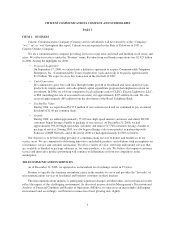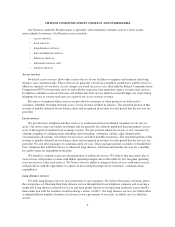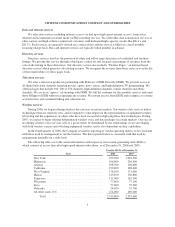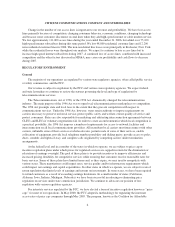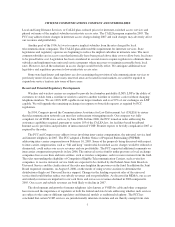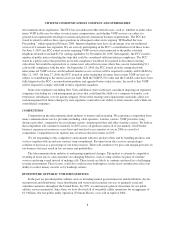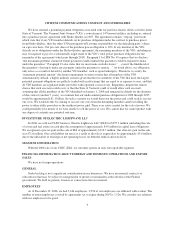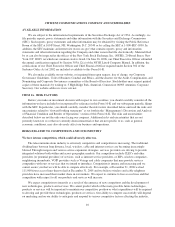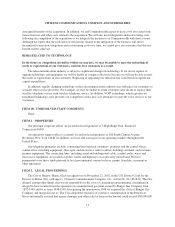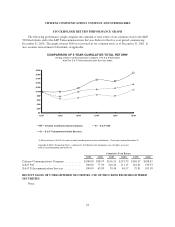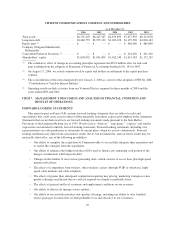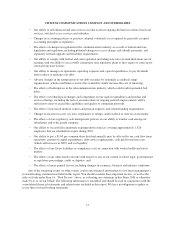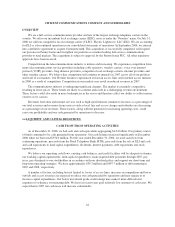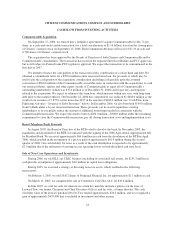Frontier Communications 2006 Annual Report Download - page 14
Download and view the complete annual report
Please find page 14 of the 2006 Frontier Communications annual report below. You can navigate through the pages in the report by either clicking on the pages listed below, or by using the keyword search tool below to find specific information within the annual report.CITIZENS COMMUNICATIONS COMPANY AND SUBSIDIARIES
access charge revenues we receive for these services is regulated by the FCC and state regulatory agencies.
Recent rulings regarding access charges have lowered the amount of revenue we receive from this source. The
FCC has an open proceeding to address reform to access charges and other intercarrier compensation. A material
reduction in the access revenues we receive would adversely affect our financial results.
We are reliant on support funds provided under federal and state laws.
We receive a portion of our revenue ($165.0 million or 8% in 2006) from federal and state subsidies,
including the federal high cost fund, federal local switching support fund, federal USF surcharge and various
state funds. FCC and state regulators are currently considering a number of proposals for changing the manner in
which eligibility for federal subsidies is determined as well as the amounts of such subsidies. The FCC is also
reviewing the mechanism by which subsidies are funded. We cannot predict when or how these matters will be
decided nor the effect on our subsidy revenue.
The federal high cost fund is our largest source of subsidy revenue (approximately $59.0 million in 2006).
We currently expect that as a result of both an increase in the national average cost per loop and a decrease in our
cost structure, there is likely to be a decrease in the subsidy revenue earned in 2007 through the federal high cost
support fund and such decrease may be significant in relation to the total amount of our subsidy revenue.
In addition, approximately $37.1 million or 2% of our revenue represents a surcharge to customers (local,
long distance and IXC) which is remitted to the FCC and recorded as an expense in “other operating expenses”.
The FCC revised the calculation for this surcharge by eliminating high speed internet connections from the
calculation effective August 15, 2006. As a result, we expect this surcharge revenue (and its associated expense)
to decrease in 2007 and such decrease may be significant in relation to the total amount of our subsidy revenue.
Our company and industry are highly regulated, imposing substantial compliance costs and restricting our
ability to compete in our target markets.
As an incumbent, we are subject to significant regulation from federal, state and local authorities. This
regulation restricts our ability to change our rates, especially on our basic services, and imposes substantial
compliance costs on us. Regulation restricts our ability to compete and, in some jurisdictions, it may restrict how
we are able to expand our service offerings. In addition, changes to the regulations that govern us may have an
adverse effect upon our business by reducing the allowable fees that we may charge, imposing additional
compliance costs, or otherwise changing the nature of our operations and the competition in our industry.
Customers are now permitted to retain their wireline number when switching to another service provider.
This is likely to increase the number of our customers who decide to disconnect their service from us. Other
pending rulemakings, including those relating to intercarrier compensation, universal service and VOIP
regulations, could have a substantial adverse impact on our operations.
RISKS RELATED TO THE ACQUISITION OF COMMONWEALTH
There is no assurance that the acquisition of Commonwealth will occur.
While we have received the requisite Hart-Scott Rodino and FCC approvals, the acquisition of
Commonwealth is still subject to a number of conditions, including the approval of the Pennsylvania Public
Utilities Commission, or Pennsylvania PUC.
The integration of Commonwealth following the acquisition may present significant challenges.
We may face significant challenges in combining Commonwealth’s operations into our operations in a
timely and efficient manner and in retaining key Commonwealth personnel. The failure to integrate successfully
and to manage successfully the challenges presented by the integration process may result in us not achieving the
13


